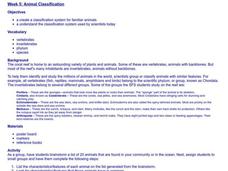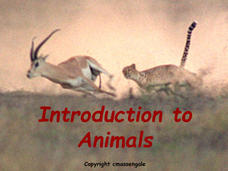Biology Junction
Phylum Porifera – The Sponges
They may not look like it, but sponges are living, breathing creatures! A PowerPoint presentation explains the important characteristics of the invertebrate Phylum Porifera, or more commonly known as the sponges. From their body...
Curated OER
Classification of an Invertebrate: Sponge
Students investigate the invertebrate sponge. In this invertebrates lesson plan, students observe the sponge, Grantia, using a dissecting microscope. Students answer questions about their observations and view six other invertebrates....
Curated OER
Sponges, Cnidarians and Worms Concept Map
In this sponges, cnidarians and worms instructional activity, students complete a concept map on simple invertebrates. They fill in 11 blanks with the correct answers from the list.
Biology Junction
Invertebrates
How many different invertebrates can you name? A thorough presentation describes the eight different Phyla of invertebrates. Each slide gives a quick overview of the important physical characteristics of each of the Phyla.
New South Wales Department of Education
Invertebrates
Of all invertebrates, insects by far are the most numerous. Scholars discuss invertebrates and then use a key to classify them. They see different examples and must describe features of each organism based upon the key.
NOAA
Invertebrates
Crabs and lobsters ... yum! The 18th installment of a 23-part NOAA Enrichment in Marine sciences and Oceanography (NEMO) program focuses on invertebrate marine life. After the lecture slideshow, learners conduct an activity to sample...
Curated OER
The Sponges
In this sponge worksheet, students read about the different parts of a sponge and answer 20 short answer questions that follow. They color and label different sponge drawing.
Curated OER
Invertebrates
In this science worksheet, students answer the problems that are related to the concept of invertebrates. The first question has the ordering of and sorting of invertebrates.
Curated OER
Invertebrates Puzzle
In this invertebrate word search puzzle, students identify names of invertebrates. Examples include names such as crabs, clams, slugs, and sponges. A list of 18 different invertebrates is included to assist the students in their search.
Curated OER
Internet Invertebrates Scavenger Hunt
In this invertebrates scavenger hunt activity, students research on the Internet 10 various types of invertebrates. They read each question first to determine what they need to look for on the Internet. Then, students respond to each...
Curated OER
Invertebrate Phyla
Young scholars explore the invertebrate phyla. They discuss the characteristics of the invertebrate Phyla in the Kingdom Animal. Students classify organisms into Phyla based on their characteristics. They distinguish radial symmetry,...
NOAA
Watch the Screen!
Can a sponge cure cancer? Life science pupils visit the drugstore under the sea in the fifth lesson of six. Working groups research the topic then get hands-on experience by testing the inhibiting effects of several plant extracts on E....
NOAA
Importance of Deep-Sea Ecosystems – Chemists with No Backbones
Marine invertebrates offer us many new options for developing pharmaceutical drugs, such as w-conotoxin MVIIA, which is extracted from the cone snail and is a potent painkiller. The instructional activity encourages scholars to research...
Curated OER
Invertebrates
In this invertebrate worksheet, learners review characteristics of the different types of invertebrates. This worksheet places 32 vocabulary words into a crossword puzzle.
Curated OER
Sponges - A Coloring Worksheet
In this sponges worksheet, students read the information about sponges. Students answer the provided questions about the reading passage. Students color the illustration at the bottom of the page.
Curated OER
Invertebrate Word Search
In this biology worksheet, students identify and locate vocabulary terms related to various types of invertebrates. There are 21 biology terms located in the word search.
Curated OER
Invertebrates
In this invertebrates worksheet, students read about the characteristics of the different groups of invertebrates. Then students complete 10 multiple choice questions.
Curated OER
What Animal Am I?
Students brainstorm different characteristics of invertebrates and investigate invertebrates by conducting Internet research.
Curated OER
The Benthic Drugstore
Students examine active chemicals that are in marine invertebrates and how they act to fight diseases. In this marine lesson students identify three pharmacologically-active chemicals, describe their disease fighting action and infer...
Curated OER
The Benthic Drugstore
Students identify at least three pharmacologically- active chemicals derived from marine invertebrates. They describe the disease-fighting action of at least three pharmacologically-active chemicals derived from marine invertebrates.
Curated OER
Animal Classification
Students list characteristics and features of animals found in their community. They then group the animals according to how they are similar and different and create names for each group. They then create a chart of their...
Biology Junction
Introduction to Animals
Out of all animals, elephants alone lack the ability to jump. Scholars learn all about animals using a presentation full of fun examples. It describes different types of animals, the biological similarities and differences between...
Curated OER
Living by the Code
Students explain why new drugs are needed to treat cardiovascular disease, cancer, inflammation, and infections. They infer why some marine invertebrates are promising sources of new drugs, explaining the process in which cells...
Biology Junction
Cnidarians
In this cnidarian worksheet, learners study the biology of the different species of cnidarians and complete a series of questions.

























